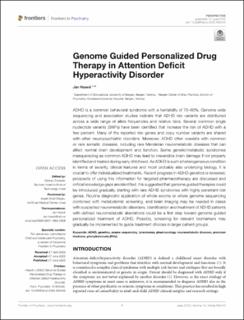| dc.contributor.author | Haavik, Jan | |
| dc.date.accessioned | 2023-03-13T12:22:22Z | |
| dc.date.available | 2023-03-13T12:22:22Z | |
| dc.date.created | 2022-10-04T12:54:02Z | |
| dc.date.issued | 2022 | |
| dc.identifier.issn | 1664-0640 | |
| dc.identifier.uri | https://hdl.handle.net/11250/3057947 | |
| dc.description.abstract | ADHD is a common behavioral syndrome with a heritability of 70–80%. Genome wide sequencing and association studies indicate that ADHD risk variants are distributed across a wide range of allele frequencies and relative risks. Several common single nucleotide variants (SNPs) have been identified that increase the risk of ADHD with a few percent. Many of the reported risk genes and copy number variants are shared with other neuropsychiatric disorders. Moreover, ADHD often coexists with common or rare somatic diseases, including rare Mendelian neurometabolic diseases that can affect normal brain development and function. Some genetic/metabolic syndromes masquerading as common ADHD may lead to irreversible brain damage if not properly identified and treated during early childhood. As ADHD is such a heterogeneous condition in terms of severity, clinical features and most probably also underlying biology, it is crucial to offer individualized treatments. Recent progress in ADHD genetics is reviewed, prospects of using this information for targeted pharmacotherapy are discussed and critical knowledge gaps are identified. It is suggested that genome guided therapies could be introduced gradually, starting with rare ADHD syndromes with highly penetrant risk genes. Routine diagnostic application of whole exome or whole genome sequencing combined with metabolomic screening, and brain imaging may be needed in cases with suspected neurometabolic disorders. Identification and treatment of ADHD patients with defined neurometabolic aberrations could be a first step toward genome guided personalized treatment of ADHD. Possibly, screening for relevant biomarkers may gradually be implemented to guide treatment choices in larger patient groups. | en_US |
| dc.language.iso | eng | en_US |
| dc.publisher | Frontiers | en_US |
| dc.rights | Navngivelse 4.0 Internasjonal | * |
| dc.rights.uri | http://creativecommons.org/licenses/by/4.0/deed.no | * |
| dc.title | Genome Guided Personalized Drug Therapy in Attention Deficit Hyperactivity Disorder | en_US |
| dc.type | Journal article | en_US |
| dc.type | Peer reviewed | en_US |
| dc.description.version | publishedVersion | en_US |
| dc.rights.holder | Copyright 2022 The Author(s) | en_US |
| dc.source.articlenumber | 925442 | en_US |
| cristin.ispublished | true | |
| cristin.fulltext | original | |
| cristin.qualitycode | 1 | |
| dc.identifier.doi | 10.3389/fpsyt.2022.925442 | |
| dc.identifier.cristin | 2058367 | |
| dc.source.journal | Frontiers in Psychiatry | en_US |
| dc.identifier.citation | Frontiers in Psychiatry. 2022, 13, 925442. | en_US |
| dc.source.volume | 13 | en_US |

